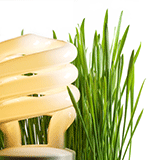
Energy Tips
- Replace traditional incandescent bulbs with Compact Fluorescent Light bulbs (CFLs). You might think of these as the little swirly guys that look like soft ice cream cones. These days, you have many choices of shapes, sizes, and colors of light. CFLs cost little up front and last up to 10 times longer than a regular incandescent light bulb.Compact Fluorescent Light bulbs create savings on your electric bill. Up to 20% of the average home’s electric bill goes for lighting. Because CFLs use up to 75% less electricity than a traditional bulb, they lower your bill and provide a quick return on investment. Ask us to show you the wide range of Compact Fluorescent Light bulbs that you can choose from.
- Install dimmers on your lights so that when you wish less light, you can reduce the amount of electricity your bulbs draw. We can install dimmers for you and also timers, motion-detector switches, and photo-sensitive switches that automatically turn off lights when you feel that they’re not needed. Ask us about the variety of dimmers and switches that will save on your electric bill, reduce carbon emissions, and save energy.
- Install a programmable thermostat to keep your house comfortably warm in the winter and comfortably cool in the summer. You can program the thermostat to “remember” to turn off or reduce heating and cooling when you’re sleeping or not at home.
- Air dry dishes instead of using your dishwasher’s drying cycle.
- Turn off your computer and monitor when not in use.
- Plug home electronics, such as TVs and DVD players, into power strips; turn the power strips off when the equipment is not in use (TVs and DVDs in standby mode still use several watts of power).
- Lower the thermostat on your hot water heater to 120°F.
- Take short showers instead of baths.
- Wash only full loads of dishes and clothes.
- Drive sensibly. Aggressive driving (speeding, rapid acceleration and braking) wastes gasoline.
Visit www.energysavers.gov for more energy-saving ideas.
